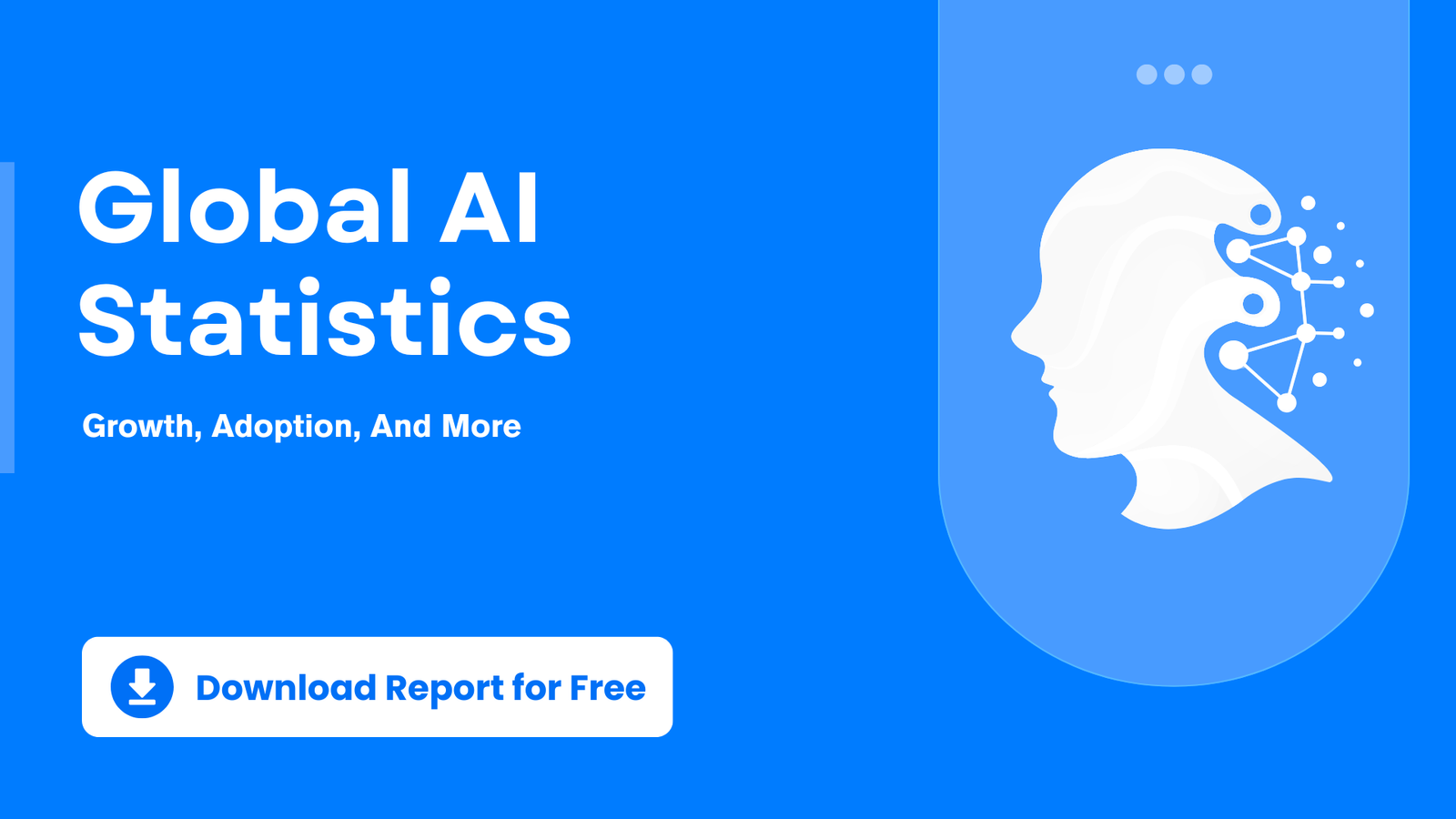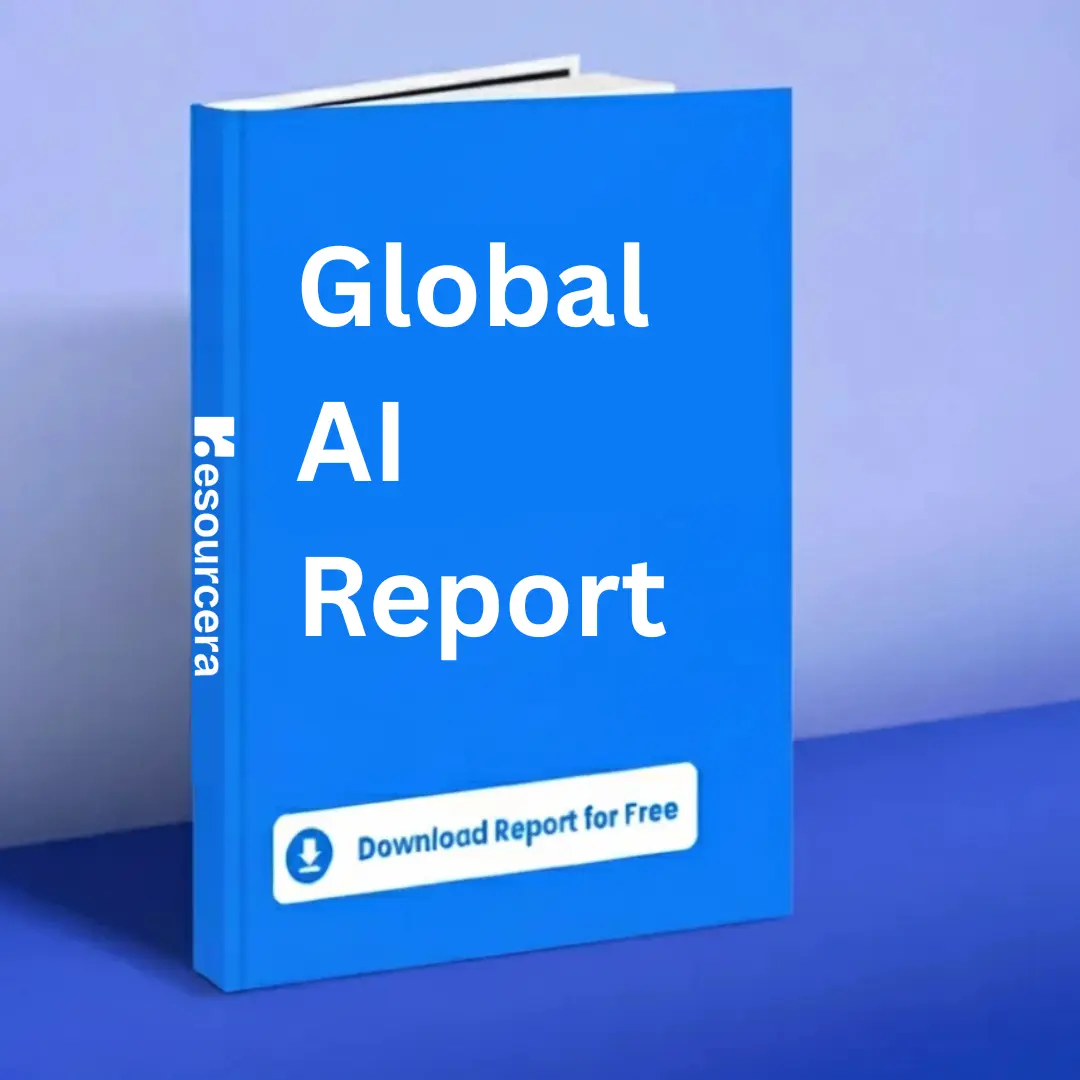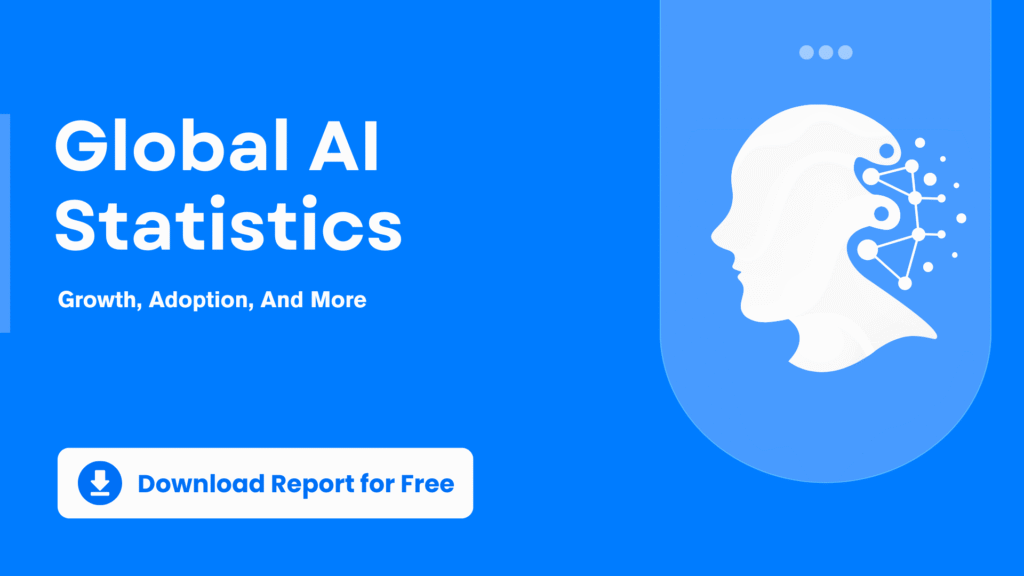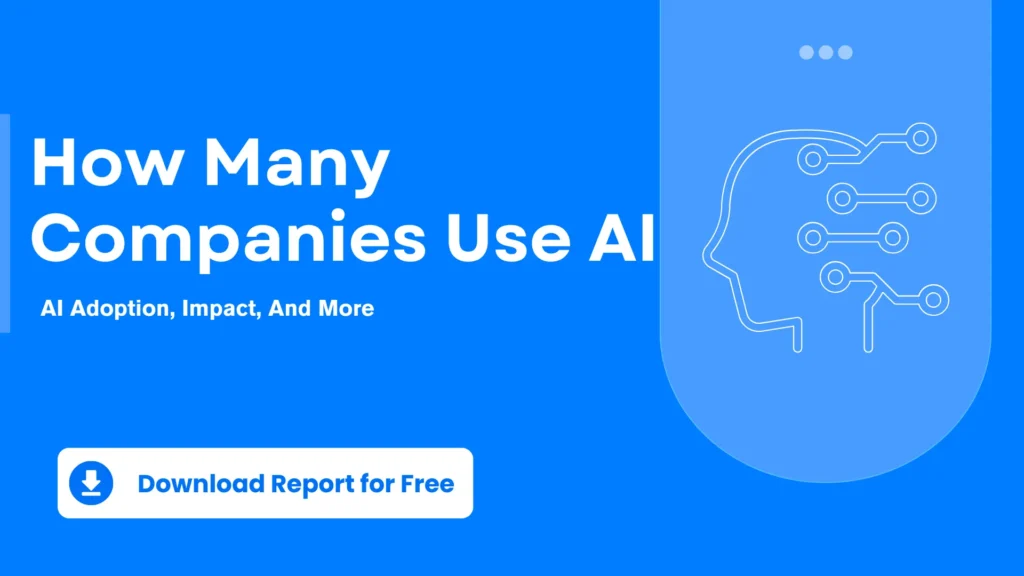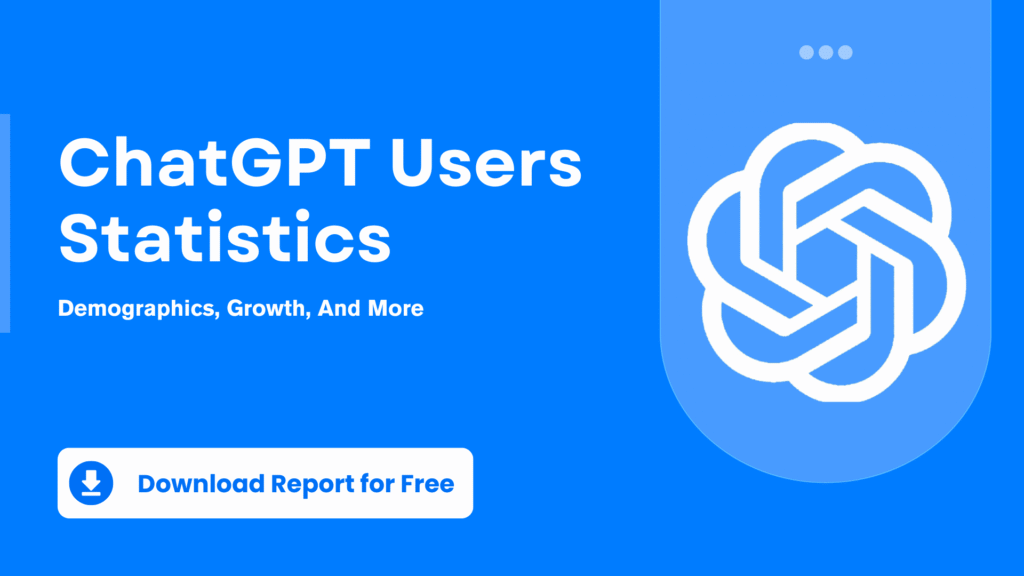AI adoption is accelerating across sectors, backed by record-level funding and widespread business integration. In 2025 alone, the global AI market is expected to generate approximately $757.6 billion in revenue, a 22% increase from the previous year. This growth is primarily driven by advancements in generative AI (GenAI) and intelligent AI agents.
Around 88% of companies globally now use AI in at least one business function, with sharp growth in areas like customer service, cybersecurity, and content creation.
This blog compiles the latest data on AI usage, funding, market growth, and workforce impact. From enterprise-level adoption to shifts in global employment, the figures offer a clear view of how artificial intelligence is reshaping industries, operations, and consumer behavior in 2025.
Top AI Statistics for 2025 from The Post
- 17.5% of the world’s AI market revenue is generated in the United States alone.
- 9 out of 10 companies around the world are using AI in at least one business function.
- 900 million people globally are actively using AI tools.
- By 2030, AI is expected to create 170 million new jobs and replace 92 million, leading to a net gain of 78 million jobs globally.
- In Q2 2025, global venture funding for AI totaled $91 billion, up from $82 billion a year earlier.
Global Artificial Intelligence Market Growth Over The Years
The global AI market is projected to generate $757.58 billion in revenue in 2025, up from $621.19 billion in 2024, a year-over-year increase of approximately 22%.
From 2025 to 2030, the market is expected to grow at a compound annual growth rate (CAGR) of around 20.6%, reaching approximately $1.89 trillion by 2030.
United States Artificial Intelligence Market Size
The United States AI market size is estimated to be $165.32 billion by the end of 2025, which means 17.5% of the world’s AI market revenue is generated in the United States alone.
The US artificial intelligence market is projected to grow at a compound annual growth rate (CAGR) of approximately 35% between 2025 and 2030, reaching a market size of $749.59 billion by 2030.
900 Million People Are Actively Using AI Tools Around The World
In 2025, around 900 million people worldwide are actively using AI tools, which equals about 11% of the global population.
316 million companies actively use AI in their operations
As of 2025, 88% of the companies globally make use of AI capabilities in at least one business function. There are a total of 359 million known companies in the world, meaning 316 million of them are actively implementing AI.
The AI usage rate among companies has increased from 72% in late 2023 and 78% in 2024.
70% of companies are using AI in at least two business functions, which is up by 31% from 2024. The number of companies leveraging AI in three or more functions has also jumped to 51%.
89% of Small businesses in the United States use AI for everyday tasks
There are 34.8 million small businesses in the United States and 89% of them use artificial intelligence capabilities for everyday tasks, that translates to 30.9 million businesses.
AI tools are helping small business owners save time, cut costs, and make faster decisions. The usage is expected to grow even stronger in the coming years as the AI tools become more accessible and user-friendly.
Most Common Ways Businesses Are Using AI
56% of businesses use AI to handle customer service, making it the most common application. Cybersecurity and fraud management follow closely, with 51% of companies adopting AI in these areas.
47% have integrated AI into digital personal assistants, while 46% use it to manage customer relationships. Another 40% apply AI to streamline inventory management.
In content creation, 35% of businesses rely on AI tools. 33% use it to power product recommendations. Both accounting and supply chain operations see AI adoption in 30% of companies.
Businesses also turn to AI for recruitment and talent sourcing, with 26% using it, while 24% apply it to segment their audiences more effectively.
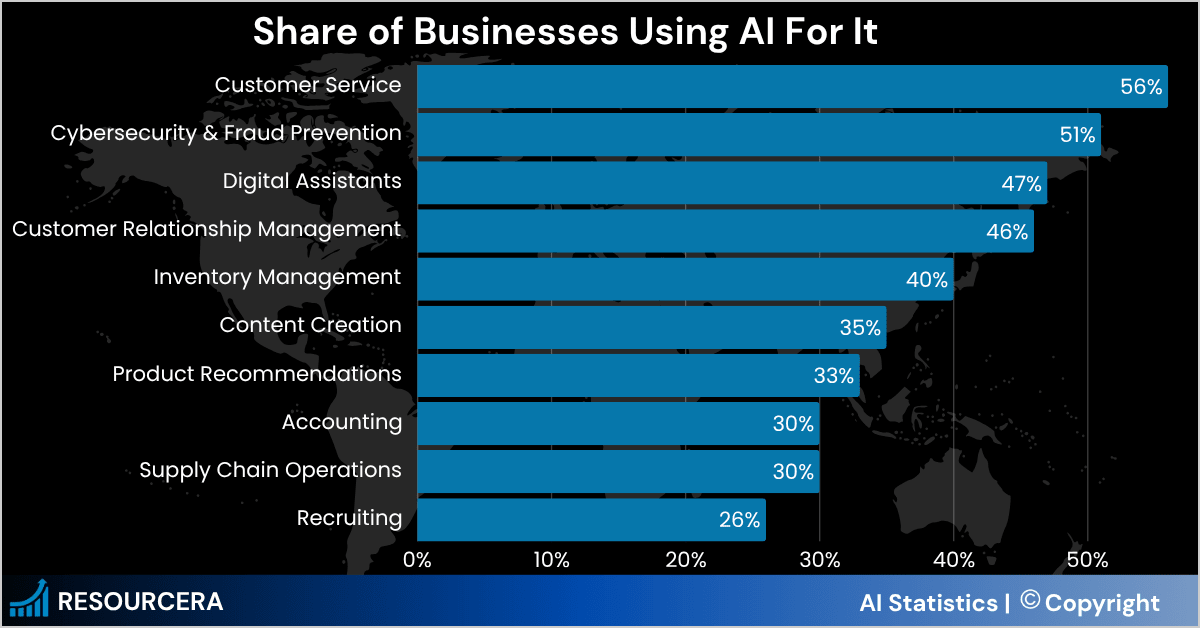
| Business Function | Share of Businesses Using AI For It |
|---|---|
| Customer Service | 56% |
| Cybersecurity & Fraud Prevention | 51% |
| Digital Assistants | 47% |
| Customer Relationship Management | 46% |
| Inventory Management | 40% |
| Content Creation | 35% |
| Product Recommendations | 33% |
| Accounting | 30% |
| Supply Chain Operations | 30% |
| Recruiting | 26% |
Source: Forbes.
74% of AI Users Are Using It At Work
A survey of 21,000 people across 21 countries show that 74% of AI users globally are already using it in their daily work, not just to boost productivity but to take on more strategic roles. Public sentiment also reflects strong support for AI in the workplace, with 84% saying it’s important for navigating complex systems and 82% valuing its role in solving business problems.
Outside of work, 65% of global respondents are excited about using AI for personal tasks such as online shopping, trip planning, and schedule management—showing that both professional and everyday applications are gaining traction.
Source: Google Public Policy.
Impact Of Artificial Intelligence On Global Workforce
By 2030, it is expected that global trends will create and replace around 22% of today’s total formal jobs. Out of this, about 170 million new jobs will be added, which makes up 14% of current employment.
This growth will be balanced out by the loss of around 92 million existing jobs, equal to 8% of today’s workforce.
In the end, the world is likely to see a net increase of 78 million jobs by 2030, which is about 7% more than what we have today.
Source: World Economic Forum Future of Jobs Report.
AI Technologies Will Drive The Most Transformation Among Businesses
By 2030, artificial intelligence and information processing technologies are expected to have the biggest impact, with 86% of employers anticipating a transformation in their business operations.
Following closely, robots and autonomous systems are projected to reshape 58% of businesses, while energy generation and storage technologies are expected to bring change to 41% of employers.
| Technology | Share of Employers Surveyed |
|---|---|
| AI and information processing technologies | 86% |
| Robots and autonomous systems | 58% |
| Energy generation, storage and distribution | 41% |
| New materials and composites | 30% |
| Semiconductors and computing technologies | 20% |
| Sensing, laser and optical technologies | 18% |
| Quantum and encryption | 12% |
| Biotechnology and gene technologies | 11% |
| Satellites and space technologies | 9% |
Source: WEF Future of Jobs Report.
Related Read: As of 2025, the AI in healthcare market is valued at $46 billion, growing at a 36% year-over-year rate. Get full insights on AI in healthcare statistics.
Privacy Is The Biggest Concern For Businesses While Implementing AI
When asked about the biggest challenges in using AI, 53% of respondents said data privacy was their top concern. This was followed by difficulties in integrating AI with existing systems (40%) and the high cost of implementation (39%).
37% of businesses said that connecting AI with their current tools and workflows has been very or extremely difficult. This highlights how complex it can be for large organizations with layered IT setups.
These findings are from just one survey. We are linking different studies so that you have an unbiased overview of the challenges that are faced by businesses around the globe when it comes to implementing AI. You will notice that the privacy factor remains at the top of every survey!
Only 25% AI initiatives have delivered expected ROI As per CEOs Globally
Only 1 in 4 AI projects have met their expected return on investment (ROI) in the past three years, based on a 2025 survey of 2,000 global CEOs.
Still, despite these limited early gains, most CEOs remain optimistic. About 85% believe they will see strong returns from AI investments focused on improving efficiency and cutting costs by 2027. Meanwhile, 77% expect positive ROI from AI efforts aimed at scaling and driving business growth.
This shows that while short-term results may fall short, long-term confidence in AI remains high.
Most CEOs Are Still In The AI Testing Phase
CEOs are pushing hard to use generative AI for growth, but progress has been slower than planned. Last year, over two-thirds expected to move past the pilot stage by 2025. This year, however, 60% admit they’re still stuck in the testing phase.
Overall, momentum has stalled. Just over half of CEOs now believe AI will drive business growth in the next five years, a noticeable drop from 67% who said the same last year.
Source: IBM.
Leading Industries In AI Adoption
Among all industries, life sciences are the most advanced in scaling AI, with 12% of companies identified as front-runners. In contrast, retail lags far behind, with just 2% reaching that stage. While 39% of life sciences firms are still experimenting with AI, another 37% have moved into the progression phase.
On average across industries, only 8% of companies are considered AI front-runners. The data highlights a clear gap in maturity between sectors, with public services and retail still struggling to move beyond early-stage experimentation.
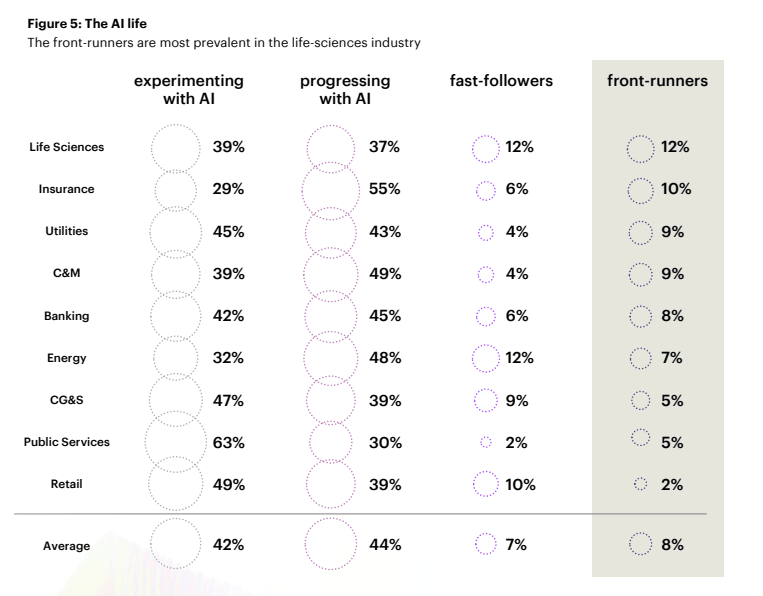
Insights On AI Fundings As of H1 2025
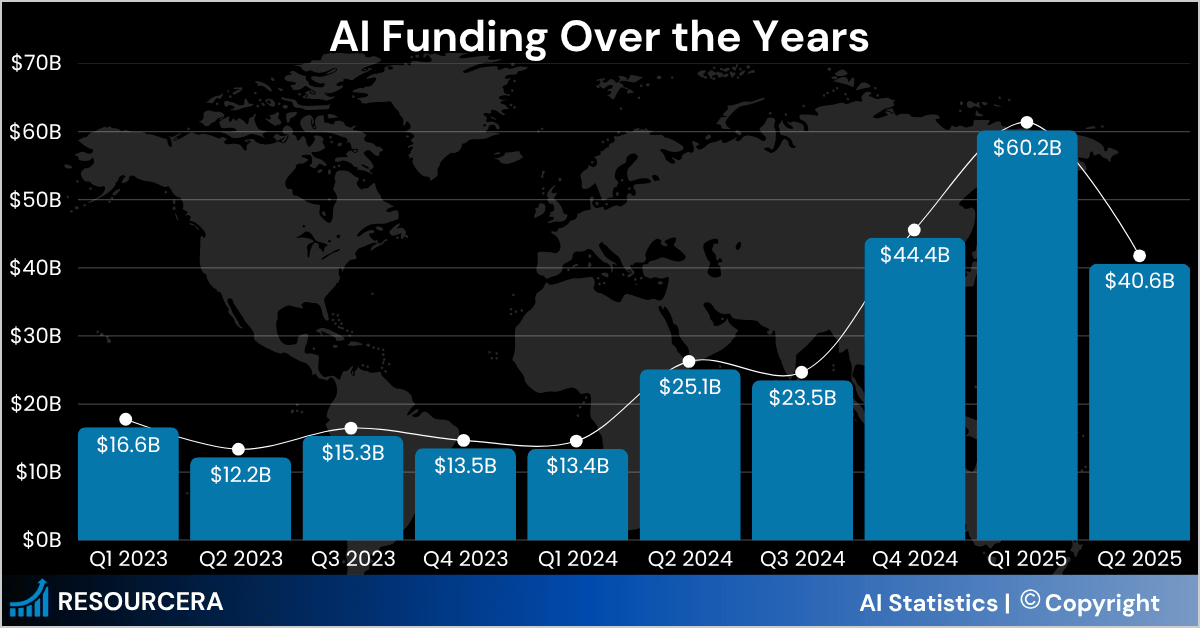
AI funding reached record highs in the first half of 2025, even as overall global venture capital showed mixed trends. In Q2 2025, global venture funding totaled $91 billion, up from $82 billion a year earlier. However, this was a drop from Q1’s $114 billion, which had marked the strongest quarter since late 2022.
| Quarter | AI Funding |
|---|---|
| Q1 2023 | $16.6B |
| Q2 2023 | $12.2B |
| Q3 2023 | $15.3B |
| Q4 2023 | $13.5B |
| Q1 2024 | $13.4B |
| Q2 2024 | $25.1B |
| Q3 2024 | $23.5B |
| Q4 2024 | $44.4B |
| Q1 2025 | $60.2B |
| Q2 2025 | $40.6B |
In Q2 alone, AI companies attracted $40 billion, about 45% of total global funding, with over a third of that amount going to Scale AI. Foundation model startups, including several that are less than a year old, pulled in multi-billion dollar rounds, showing that investor confidence in AI innovation remains high.
The U.S. dominated the AI funding landscape, with two-thirds of all global venture capital, around $60 billion, going to the U.S.-based companies.
Key Stats:
- Scale AI alone raised $14.3 billion in Q2.
- Thinking Machines Lab and Safe Superintelligence each raised $2 billion in seed or early rounds.
- Grammarly secured $1 billion, Anysphere $900 million, and Helsing $694 million.
- H1 2025 saw total global funding of $205 billion, up 32% from H1 2024.
- Two of the largest venture rounds ever, OpenAI’s $40B in Q1 and Scale AI’s $14.3B in Q2, happened in 2025.
Source: Crunchbase
Agentic AI Statistics
- The AI agents market is estimated to be valued at $7.38 billion in 2025 and will continue to grow at a CAGR of 44.8% and reach $47.1 billion by 2030. (PRNewswire)
- 11% of companies are developing AI agents in-house while 23% are looking to deploy AI agents developed by trusted tech providers. (KPMG)
- Nearly 70% of consumers say they would rely on AI to book flights, while 65% are open to using it for hotel and resort reservations. 50% and 60% of shoppers are willing to use AI to assistWhen it comes to everyday grocery purchases. (Statista)
- 80% of retail and online businesses either use AI chatbots or plan to use them soon. (Gartner)
- 79% of employees say AI agents have improved their business performance. (McKinsey)
Related Stat: See How AI Is Being Used in Education, Check out the Stats on AI in Education.
Chatbot AI Statistics
- The global chatbot market is worth approximately $15.57 billion as of 2025 and is expected to grow at a 24.53% CAGR to be over $46 billion by 2029. (GlobeNewswire)
- AI is projected to handle 80% of all customer interactions by 2030.
- 42% of businesses say they are using chatbots and predictive analytics to improve operations and boost customer engagement. (Hostinger)
- Businesses save around 30% on customer support costs with the help of chatbots (Invesp)
- 65% of users want their queries and issues dealt with without any human support. (AdWeek)
